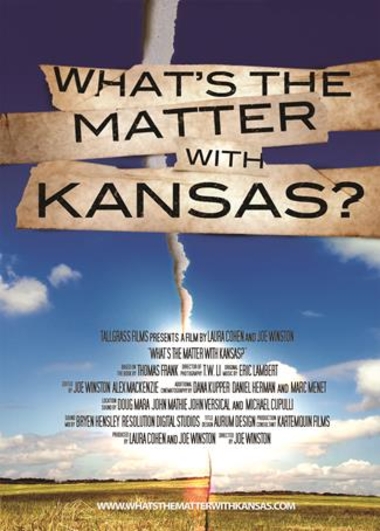What’s The Matter With Kansas?

Red States, marriage wars and other ‘moral’ issues
My bailiwick here at The Gayly is to review current and upcoming DVD releases that might have a particular interest to our readership. I’m going to step a little outside of that by addressing a four-year-old DVD release, What’s The Matter With Kansas? It’s a 90 minute documentary, based on the 2004 book of the same name by author Thomas Frank. The book’s subtitle, ‘How Conservatives Won the Heart of America.’ is the theme explored in the movie.
This film, by husband and wife documentarians, Laura Cohen and Joe Winston, examines how moral values (above all other considerations) have become the determining factor in voting for those self-identifying as conservative. Their analysis of this theme is going to be used here as a jumping-off point for a broader discussion of marriage equality.
Surprisingly for most, the Midwest at the turn of the last century was the center for Socialism in America. The ‘Appeal to Reason,’ published in Girard, Kansas, was a weekly political newspaper from 1895 to 1922. In 1910, their circulation was over half-million subscribers. Kansas, and indeed much of the Midwest, was a center of liberal thinking. So, how did things change so much in the last hundred years?
Conservative politicians have always had a primary concern toward financial growth and wealth preservation and those things relate themselves to the most financially advantaged among us. This agenda wasn’t winning Republicans the support of the populace in general. The GOP needed to find an appeal that would curry favor with those not directly benefited by their financial agendas. The move to the right, and then on to the ‘far right,’ in the Midwest came about as conservative politicians came to realize (quite brilliantly), that to appeal to a broader base, they must address the social or ‘moral’ concerns of that broader populace of voters.
America was a nation of two classes, poor and wealthy, until early in the 1900’s. The development of the middle-class occurred in the first half of the last century, and this new class of citizens who arose after the Great Depression, became the marketing target of the far right. This class of workers who had much-improved working conditions and financial advantages than they had previously known (due in no small part to the formation of strong unions), came to view themselves as distinctly different from those still living in financial privation. They began to identify far more closely to the rich than the poor.
At the same time, social issues became more intrusive on the carefully structured lives of the middle class. The civil rights movement, immigration, drugs, and a host of other issues caused an even greater stratification which pushed the middle class to view themselves as far more closely aligned with the rich than the poor.
A growing attitude of ‘us and them’ was the perfect soil for the far right to beginning planting seeds for a broader appeal. And the appeal that took root and grew was moral values. Votes could be gained by inducing the middle class to look past any financial agendas that would not benefit them, and concentrate on issues that appealed to their religious viewpoint.
So, the far right came to know great success by appealing to issues of abortion and gay rights. They speculated, and correctly so, that the religious right wanted a country of laws that reinforced their own viewpoint. The far right was happy to support legislation which reinforced their own beliefs, regardless of how that impacted the rights of others. Again, 'us and them' raised it's ugly head, and it was all right to integrate faith-based beliefs into law.
So, kind of a long discussion to bring us to marriage equality, huh?
Equal rights for all citizens, regardless of which right, have always only come after hard-fought battles to gain those recognitions. The battle for marriage equality continues, but has found some limited success in this country.
Though the battle is now state by state, the battle also rages in the nation at large. And that battle must ultimately be won for recognition to come to all states, including those which are bastions of far right conservatism. A huge step forward happened on June 26, 2013 when the Supreme Court struck down as unconstitutional the 'Defense of Marriage Act,' which identified marriage as only between one man and one woman. However, it did not take up the broader issue of whether gay marriage was legal and constitutionally protected.
The battle for marriage equality rages on. The ballot box is one of the tools in our arsenal, so VOTE whenever you have an opportunity. We each need to do our part in the fight!
by Ray Freer, Entertainment Columnist
The Gayly – June 8, 2014 @ 12:20pm





